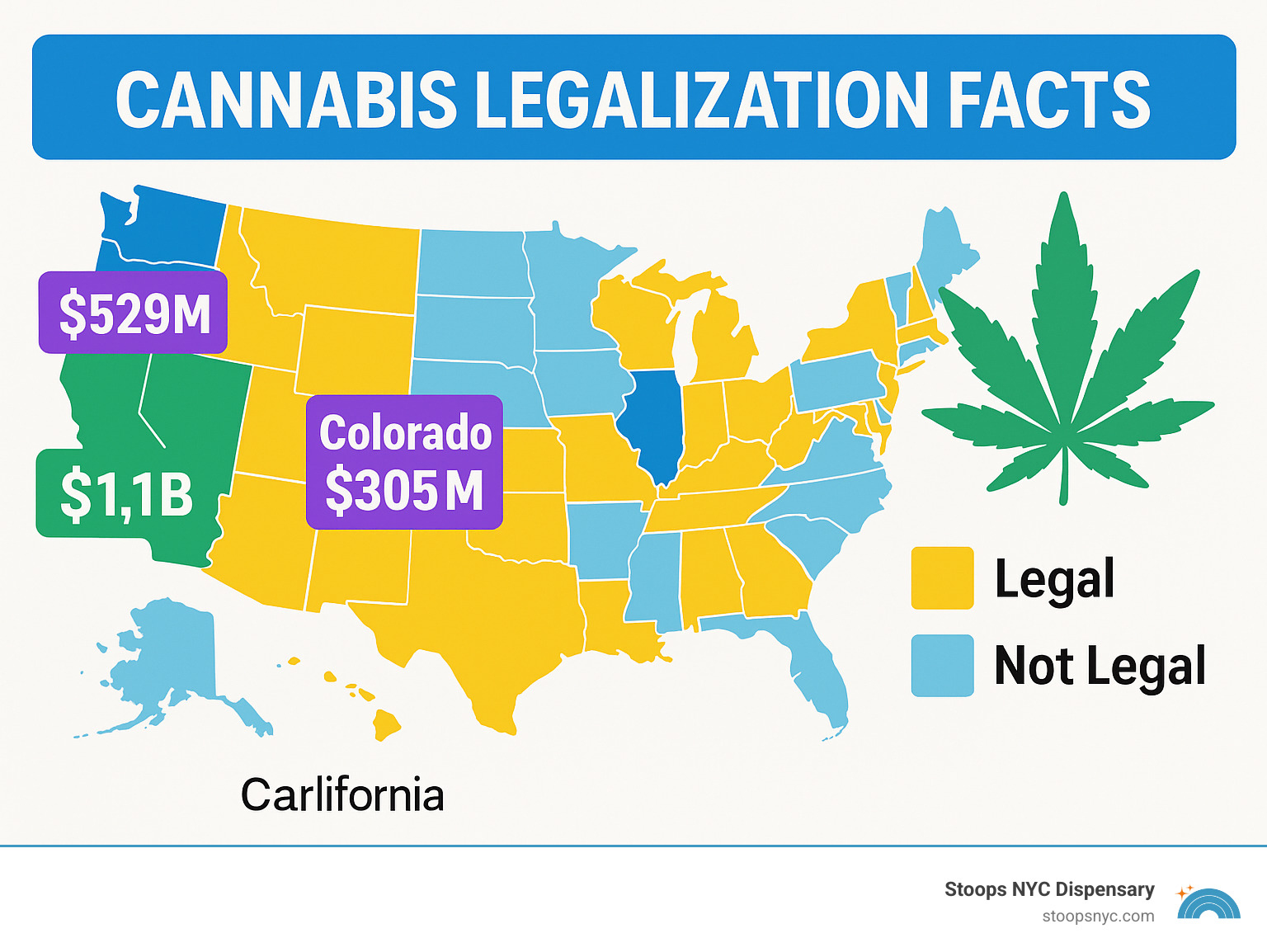As of 2025, cannabis is still not legal federally, despite more than half of U.S. states legalizing it for medical or recreational use.
For people in New York, this gap between state and federal cannabis laws creates a lot of confusion. You can buy and use cannabis legally in the state. But since it’s still illegal federally, it can cause problems with travel, banking, and federal rules.
Here’s everything you need to know about federal cannabis laws, how they clash with New York’s legalization, and what it means for you as a consumer.
Current U.S. Legal Status: Is Cannabis Legal Federally?
As of 2025, cannabis is still illegal at the federal level. Although most states, including New York, have legalized it for medical or recreational use (24 states + plus DC allow adult recreational use)
This state vs. federal conflict creates confusion for consumers since federal laws still affect travel, banking, and taxes.
Federal illegality also limits research funding, interstate commerce, and business protections for cannabis companies.
Until federal laws change, New York residents must follow state rules carefully and be aware of federal restrictions, especially when crossing state lines or dealing with federal agencies.
Efforts for federal legalization are ongoing, but progress has been slow, with bills like the MORE Act and SAFER Banking Act still waiting for full approval.
Organizations like the National Cannabis Industry Association (NCIA) advocates for federal reforms like banking access, fair taxation, and full legalization to protect both businesses and consumers.
Stoops NYC is a proud NCIA member, supporting their mission to create clearer, safer, and fairer cannabis laws at the federal level.
The Difference Between State and Federal Cannabis Laws
Here’s where cannabis legalization facts get confusing. Under the 1970 Controlled Substances Act, marijuana still sits in Schedule I with heroin, meaning “no accepted medical use.” Yet 24 states and D.C. allow adult sales, and 38 have medical programs.
This clash creates a problem: you can legally buy cannabis at Stoops NYC under New York law, but you are still breaking federal law once you walk out. Federal prosecutors rarely target state-compliant businesses, in part because the annually renewed Rohrabacher-Blumenauer amendment blocks spending on such prosecutions.
| Comparison | Federal Law | New York Law |
|---|---|---|
| Possession (≤1 oz flower) | Up to 1 year prison, $1,000 fine | Legal 21+ |
| Medical Use | Not recognized | Legal with qualifying conditions |
| Business Operations | Felony trafficking | Licensed & regulated |
| Banking | Money-laundering risk | State-authorized |
Rescheduling & SAFE Banking
In 2023 the Department of Health and Human Services urged the DEA to move cannabis to Schedule III.
Rescheduling would acknowledge medical value but would not by itself legalize adult use. Meanwhile, the stalled SAFE Banking Act would let banks work with licensed operators—a vital step for small businesses and equity applicants.
Medical vs. Recreational Frameworks
Medical systems require a doctor’s approval and usually grant higher possession limits and lower taxes.
Recreational programs are simpler: show ID proving you are 21+. New York lets consumers choose which route fits best.
Cannabis Legalization Facts: National Trends & Public Opinion
Public opinion has flipped in a generation.
In 2000 only one-third of Americans supported legalization; by 2023 that number reached 70 % (Gallup). Roughly 52.5 million Americans—about one in five adults—used cannabis in 2021.
Support skews young (71 % under 30) but now crosses party lines; even 42 % of Republicans favor full legalization.
Key Facts at a Glance
- 1996: California launches first medical program
- 2012: Colorado & Washington legalize adult use
- 45 states now offer record-clearing paths
- Legal markets have generated billions in taxes and 440,000+ jobs
Tips for NY Cannabis Consumers
Bring a government ID confirming you are 21+ to any New York dispensary. Typical daily limits are 1 oz of flower and 5 g of concentrates.
Consumption is restricted to private property; public use or driving while high is illegal. For details see our FAQs.
Public Health Impacts: Risks, Benefits, and Use Patterns
The National Academies conclude cannabis is neither harmless nor uniquely dangerous. About 3 in 10 regular users develop cannabis use disorder (CUD); compare 15 % for alcohol and 32 % for tobacco.
Evidence-based benefits include relief of chronic pain, chemotherapy nausea, multiple-sclerosis spasticity, and some rare epilepsies.
Risks include impaired driving, lung irritation from smoke, and possible developmental harms during pregnancy.
Adult & Youth Use After Legalization
Monitoring the Future shows teen use has stayed flat—or fallen slightly—in legalization states, and seniors report marijuana is now harder to obtain.
However, accidental ingestion of edibles by children has risen, underscoring the need for child-proof storage.
Cannabis Use Disorder & Vulnerable Groups
Starting before age 18, daily use, or consuming high-potency products increases CUD risk. P
eople with certain mental-health conditions should consult a physician before using cannabis.
Opioid-Related Findings
Medical-cannabis states have lower opioid-overdose deaths on average, suggesting cannabis may help reduce reliance on more dangerous painkillers.
Economic & Criminal-Justice Outcomes

Since 2014 adult-use states have collected $24.7 billion in cannabis taxes and now support 440,000 full-time jobs.
In 2024 alone they added $4.4 billion in revenue.
States often dedicate this money to schools, public health, and social-equity grants. Colorado alone has poured hundreds of millions into school construction.
Legalization also saves money. Nationally we still spend up to $10 billion a year policing cannabis; legalization states have cut thousands of low-level arrests and freed resources for serious crimes. Yet Black Americans remain 3.6× more likely to be arrested, proof that equity efforts must continue.
Twenty-eight states now offer automatic or streamlined expungement, helping people move beyond prohibition-era records.
Regulation Challenges: Product Safety, Driving, and Record Clearing
Licensed markets require lab testing for potency, pesticides, heavy metals, microbes and residual solvents. Packages must list THC/CBD content, health warnings and batch numbers.
Impaired driving remains a policy hurdle: THC can stay in blood long after effects subside, so states use either per-se limits or roadside sobriety tests. The safest rule is simple—don’t drive high.
Edibles & Accidental Ingestion
Child-resistant, opaque packaging and 10 mg serving caps aim to prevent overconsumption. Store edibles locked away; delayed onset can fool newcomers into taking too much.
Transparency
Seed-to-sale tracking and publicly available Certificates of Analysis let consumers verify product safety—an advantage illegal markets cannot match. For more education, visit our Cannabis Education hub.
What This Means for You
Cannabis laws and research are changing quickly, and unanswered questions remain—especially around long-term health and social equity.
Federal reform could streamline banking, research and interstate commerce, while still letting states craft the details.
The basics stay the same: know your local rules, buy tested products, and consume responsibly.
Frequently Asked Questions about Cannabis Legalization
Does state law override federal law?
No, state law does not override federal law. Under the U.S. Constitution’s Supremacy Clause (Article VI), federal law is considered the “supreme law of the land.” That means when state and federal laws conflict, federal law typically takes precedence.
However, when it comes to cannabis legalization, things get complicated. Here’s why:
Federal Law: Cannabis remains illegal at the federal level under the Controlled Substances Act (CSA), where it’s classified as a Schedule I drug (the strictest category).
State Law: Many states have legalized cannabis for medical or recreational use, creating a legal framework that operates independently of federal prohibition.
What this means for you:
Federal Enforcement Discretion: Federal agencies technically have the authority to enforce federal law anywhere in the U.S., even in states where cannabis is legal. However, in recent years, federal policy has largely taken a “hands-off” approach to state-legal cannabis programs, focusing enforcement on issues like preventing sales to minors or interstate trafficking.
Legal Conflicts Still Exist: Because federal law hasn’t changed, businesses and consumers face restrictions on banking, interstate commerce, federal property possession, and travel involving cannabis—even if it’s legal under state law.
So while states can pass and enforce their own cannabis laws, they cannot override federal law—only Congress or federal courts can change that.
Does legalization increase teen cannabis use?
This is one of the most common concerns parents and community members have about cannabis legalization. The data provides reassuring answers.
Government surveys consistently show that teen marijuana use has not increased in states that have legalized cannabis for adult use.
Many legalization states have actually seen decreases in youth usage rates.
The Monitoring the Future survey, which has tracked teen substance use for decades, found something surprising: high school seniors’ perceived availability of marijuana fell from over 80% before legalization to 72.7% in 2023.
Why might this be happening?
Licensed dispensaries require strict ID verification and face serious penalties for selling to minors, unlike illegal dealers who typically don’t check IDs.
When you take cannabis sales out of the black market and put them in regulated stores, it can actually make it harder for teens to access these products.
The research suggests that well-regulated legal markets, combined with education about responsible use, may be more effective at protecting young people than prohibition alone.
Is CBD federally legal?
Yes. CBD derived from hemp with less than 0.3% THC is federally legal under the 2018 Farm Bill. However, the FDA restricts CBD in food and dietary supplements, and state laws may impose additional regulations.
Can I drive after consuming legal cannabis?
No. Driving under the influence of cannabis is illegal in every state, even where cannabis itself is legal.
Cannabis can impair coordination, reaction time, and judgment, and unlike alcohol, there’s no clear standard for “safe” levels of THC.
How are past possession records cleared in New York?
New York has made significant progress on addressing past cannabis convictions. The state has automatic expungement provisions for certain cannabis offenses, meaning many people don’t need to take any action to have their records cleared.
As of 2023, New York is among 45 states that have record-clearing laws, with 28 states having cannabis-specific provisions.
In New York, many cannabis convictions are automatically sealed, though some cases may require filing petitions with the court.
The process varies depending on your specific situation and jurisdiction, but New York has generally tried to eliminate fees and simplify procedures. This is especially important because past cannabis convictions have created barriers to employment, housing, and other opportunities for millions of Americans.
If you’re unsure about your specific situation, check with local courts or legal aid organizations for guidance.
Many community organizations also provide free assistance with record clearing processes. The goal is to ensure that people aren’t continuing to face consequences for activities that are now legal for adults in New York.
